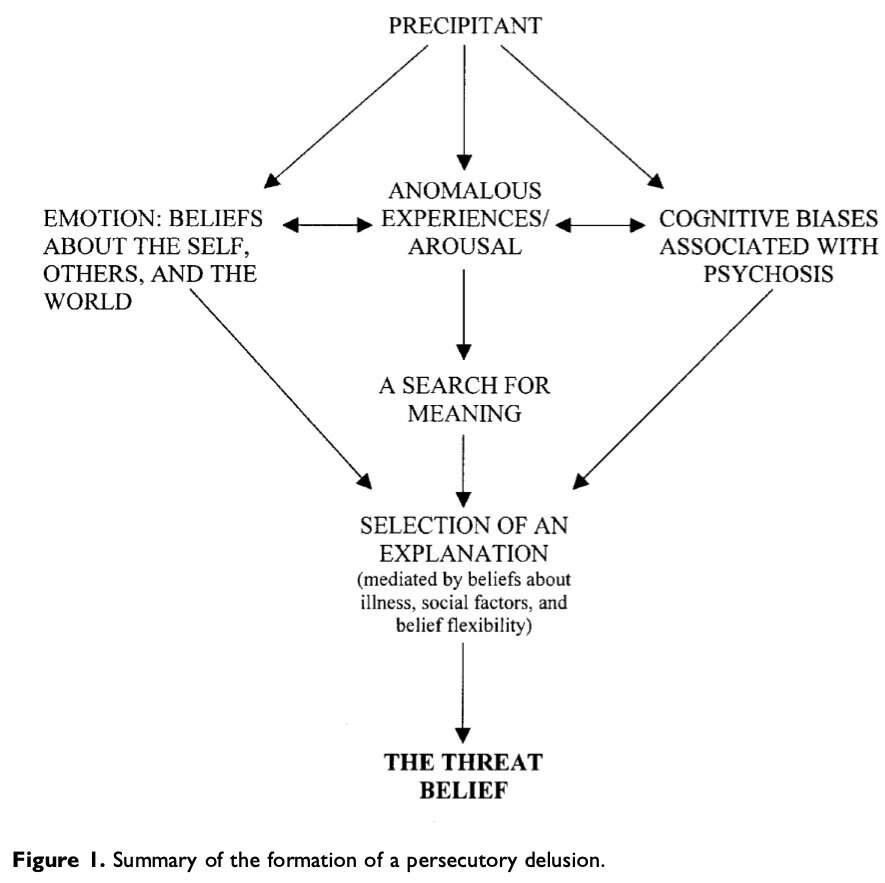The Relationship between Interpersonal Self-Concept and Paranoia in Patients with Schizophrenia
Beck Institute Blog
A recent study published in Behavior Therapy examined the relationship between interpersonal self-concept and global self-worth, and psychotic and depressive symptoms in patients with psychosis. The participants consisted of 83 patients, all of whom had diagnoses on the schizophrenia spectrum, and 33 healthy individuals. The researchers measured each participant’s global self-worth, interpersonal self-concept, dysfunctional beliefs, positive and negative symptoms, delusions, paranoia, and depressive symptoms.
Results showed that (1) Global self-worth is related more to depression than it is to paranoia, (2) the perception of not being accepted by others is more related to psychotic symptoms, (3) individuals who believe that others evaluate them positively have lower levels of paranoia, regardless of their dysfunctional beliefs levels, and (4) negative self-concept (i.e., not being respected , trusted, loved, and accepted by others) is most closely related to positive symptoms, paranoia, and psychosis.
The significant correlation between dysfunctional interpersonal self-concept, dysfunctional attitudes, and paranoia reinforces the formulation-based cognitive approach to delusions and the importance of eliminating dysfunctional self-concepts. The results of this study suggest that cognitive therapy may be successful in treating persecutory delusions and paranoia by focusing on interpersonal and threat-related self-concepts.
Lincoln, T.M., Mehl, S., Ziegler, M. Kesting, M.L., Exner, C., & Rief, W. (2010). Is fear of others linked to an uncertain sense of self? The relevance of self-worth, interpersonal self-concepts, and dysfunctional beliefs to paranoia. Behavior Therapy, 41, 187-197.
Beck Institute Blog
A recent study published in Behavior Therapy examined the relationship between interpersonal self-concept and global self-worth, and psychotic and depressive symptoms in patients with psychosis. The participants consisted of 83 patients, all of whom had diagnoses on the schizophrenia spectrum, and 33 healthy individuals. The researchers measured each participant’s global self-worth, interpersonal self-concept, dysfunctional beliefs, positive and negative symptoms, delusions, paranoia, and depressive symptoms.
Results showed that (1) Global self-worth is related more to depression than it is to paranoia, (2) the perception of not being accepted by others is more related to psychotic symptoms, (3) individuals who believe that others evaluate them positively have lower levels of paranoia, regardless of their dysfunctional beliefs levels, and (4) negative self-concept (i.e., not being respected , trusted, loved, and accepted by others) is most closely related to positive symptoms, paranoia, and psychosis.
The significant correlation between dysfunctional interpersonal self-concept, dysfunctional attitudes, and paranoia reinforces the formulation-based cognitive approach to delusions and the importance of eliminating dysfunctional self-concepts. The results of this study suggest that cognitive therapy may be successful in treating persecutory delusions and paranoia by focusing on interpersonal and threat-related self-concepts.
Lincoln, T.M., Mehl, S., Ziegler, M. Kesting, M.L., Exner, C., & Rief, W. (2010). Is fear of others linked to an uncertain sense of self? The relevance of self-worth, interpersonal self-concepts, and dysfunctional beliefs to paranoia. Behavior Therapy, 41, 187-197.


